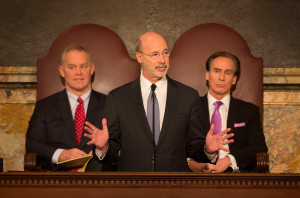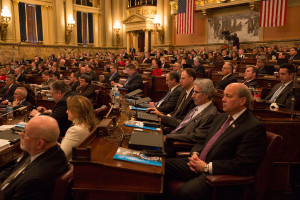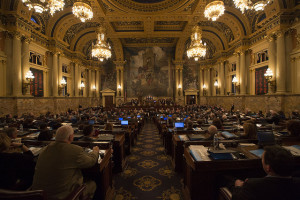
Gov. Tom Wolf at his 2016-17 Budget Address on Feb. 9, 2016. House Speaker Mike Turzai and Lt. Governor Mike Stack are seated behind him. Photo courtesy of Gov. Tom Wolf | flickr.com
In the first months of every calendar year, Pennsylvania’s governor addresses the elected officials and citizens of the Commonwealth, laying out his budget priorities for the fiscal year that will start July 1. More than a wish list, the governor’s proposal specifies how much funding government agencies and programs will have, and where exactly that funding will come from.
But this year’s address was like no other in Pennsylvania’s history. Governor Wolf was supposed to set forth a plan for how Pennsylvania would budget its operations in the coming year – ideally with spending and costs balanced against its taxes and other revenue streams. Yet state legislators still hadn’t agreed on a budget for this year, now more than half over.
With insufficient revenues to cover current spending obligations, and with House leaders still refusing to negotiate, government operations are beyond out of balance. There is no more road to kick the can — Pennsylvania is now poised on the brink of enormous deficit. Unless something is done, and fast, we’ll all soon be plummeting into a $2 billion hole.
Wolf spoke passionately but plainly in his address to Pennsylvanians about what we should expect in the coming months if the current budget stalemate and funding crisis continue. The governor made clear that he couldn’t responsibly talk about all the great things he wants for Pennsylvania if Harrisburg can’t even pay for the basic things our commonwealth needs.
Forget a world-class education system with universal access to quality pre-k and fair funding for low- and high-income schools alike, Wolf said. Low-income school districts will continue to have crowded classes and limited courses; there will be even deeper cuts to these underfunded schools, as well as to Head Start, special ed, and higher ed.
Forget innovations and partnerships to improve government, job development, and workforce training; we can’t even cover basic services or infrastructure. And just forget entirely about criminal justice reform, legalizing medical marijuana, expanding protections for LGBT people, and boosting the minimum wage.
This certainly isn’t what the majority of Pennsylvanians had envisioned when they pulled the lever for Tom Wolf back in 2014. Voters took the historic step of unseating Gov. Corbett after one term because when faced with a similar budget crisis in 2011, Corbett and the General Assembly had chosen – instead of raising taxes on corporations and the wealthy – radical budget cuts to education and human services.
Despite this clear message from the voters, as the director of Pennsylvania Budget and Policy Center Marc Stier puts it, a majority of our state legislators “aren’t willing to pay for the government we have, let alone the government we really need.”
They certainly seem unwilling to break from 25 years of bad habits. Like protecting top dollar earners from paying their fair share in taxes. In addition to enjoying federal corporate tax breaks and loopholes, 71% of Pa. corporations also pay no state income taxes.
In recent years, a majority of legislators have also opposed an ongoing (or “severance”) tax on natural gas drilling. Recent reports indicate that this may be due solely to the obstruction of state Republican leader Mike Turzai (Allegheny County), who now wants to give the gas industry an even bigger tax break.
Our state and our nation have fully run the experiment on corporate handouts and trickle-down economics – the idea that tax breaks to those at the top of our economy somehow provide wealth to those at the bottom. We now have decades of data to show that this simply doesn’t work: the rich have indeed gotten richer, but the gap between rich and poor has never been bigger. Cutting taxes on corporations doesn’t actually create jobs, though raising taxes on “job creators” does.
States like California and Minnesota that have faced similar budget crises and huge shortfalls chose to raise taxes so they could maintain their spending. They then saw their economy grow. Their elected officials understood that, contrary to standard Republican dogma, government spending is a key economic driver especially during times of recession and unemployment.
Pennsylvania legislators used to understand this, says Stier. Our state was one of the first outside of New England to fund public schools, making education accessible not just for the wealthy. As a result, in the 19th and 20th Century, Pennsylvania was one of the country’s economic powerhouses due to its skilled and educated – and unionized and immigrant-friendly – workforce. State government provided the infrastructure, transportation, communication networks, and other facilities that help businesses grow.
“It seems these days too many of our legislators want to reverse all that. They want less education, less unions, less government support of economic growth, less immigrants, and no broadly shared prosperity – only for the very top.”
It’s time to stop clinging to an outdated and unproven vision of how a major state like Pennsylvania can function – or not function, as the case may be. Republican leaders must abandon their apparent agenda of starving the government of dollars so it is forced to limit its functions and services, rather than simply doing their jobs and creating reliable revenue streams so government can do what it does best: serve the greater good.
Our legislators must pass a responsible budget that raises the billions of dollars in revenue we need – yes, by raising some taxes, particularly on gas drillers, banks, financial corporations, and the wealthy. Otherwise we face even more teacher and staff layoffs, and perhaps even shuttered schools. The state’s human services offices and providers, which help neglected children, the aged, homeless veterans, and people with disabilities and mental illness, among others – and have been underfunded since cuts made during the prior administration – will face further cuts to their funding as well.
It’s understandable that many middle and low-income Pennsylvanians are financially struggling and desperate to avoid further taxes, given how backwards and unfair Pennsylvania’s tax system already is. But it’s deeply cynical of 1%-er organizations like the Commonwealth Foundation to use the fear and anger of those households to marshal strategic attacks on public schools and labor unions (amid fake attacks on corporate welfare). This, instead of the fundamental reforms that are needed to achieve fair and effective government taxes and spending.
Polls show that the majority of Pennsylvanians aren’t falling for it. Though deeply frustrated, they support the governor’s commitment to restoring funding to education and human services. They understand the many ways in which a fully and fairly funded government can help us all. They see how a government that’s been brought to its knees will bring its citizens to their knees too.
And they know it’s well past time for their legislators to stand up for all Pennsylvanians and protect our commonwealth.






I will not vote for any Senators or House Representatives currently serving. I also encourage others to do the same. I have lost confidence in their ability to govern PA.